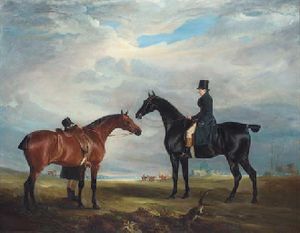The Quorn

Frank Hall Standish with the Quorn Hunt, by John Ferneley, Snr, 1819
|
|
| Hunt type | Fox hunting |
|---|---|
| Country |
|
| History | |
| Founded | 1696 |
| Founded by | Mr Thomas Boothby |
| Hunt information | |
| Hound breed | Foxhound |
| Hunt country | Leicestershire |
| Master(s) | Mr E. R. Hanbury, MFH, Mr J. Mossman, MFH, Mrs J. Jewell, MFH & Mrs E. Murfitt, MFH. |
| Huntsman | Mr Peter Collins |
| Whipper(s)-in | Mr Elliott Stokes |
| Quarry | Fox |
| Kennelled | Kirby Bellars |
| Website | www.quorn-hunt.co.uk |
The Quorn Hunt, usually called the Quorn, established in 1696, is one of the world's oldest fox hunting packs and claims to be the United Kingdom's most famous hunt. Its country is mostly in Leicestershire, together with some smaller areas of Nottinghamshire and Derbyshire.
Despite the abolition of fox hunting intended by the Hunting Act 2004, the Quorn continues to go out on four days of the week during the autumn and winter months.
The hunt traces its origins to a pack of foxhounds established in 1696 at Tooley Park, Leicestershire, by the youthful Thomas Boothby (1677–1752). Its present name comes from the village of Quorn (also known as Quorndon), where the hounds were kennelled between 1753 and 1904, having been established there as a result of the hunt's second master, Hugo Meynell, buying Quorndon Hall from the 4th Earl Ferrers. Following more than half a century under Boothby, Meynell was Master for forty-seven years, and such was his innovative mastery of fox hunting that he has been called 'The Primate of the Science'.
In 1905 new kennels and stables were built at Paudy Lane, Seagrave, and are now listed buildings. The hunt's present-day kennels are at Gaddesby Lane, Kirby Bellars, near Melton Mowbray.
Before gaining its present title in the mid 19th century, the hunt was often known by the name of its Master: for instance, from 1827 to 1831 it was called 'Lord Southampton's Hounds'. Until 1884, the hounds were owned by the Master and a change of mastership was either by purchase or inheritance. The hounds are now said to be "owned by the country", that is, by the hunt organization.
...
Wikipedia
